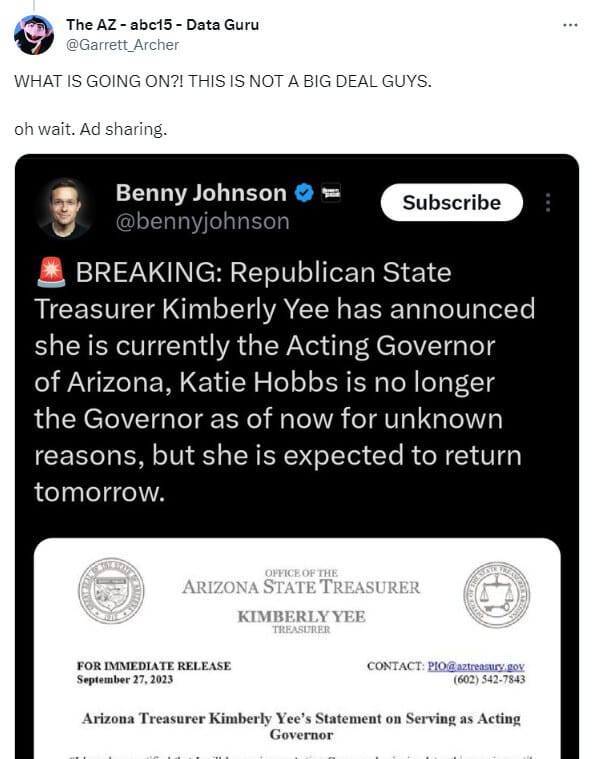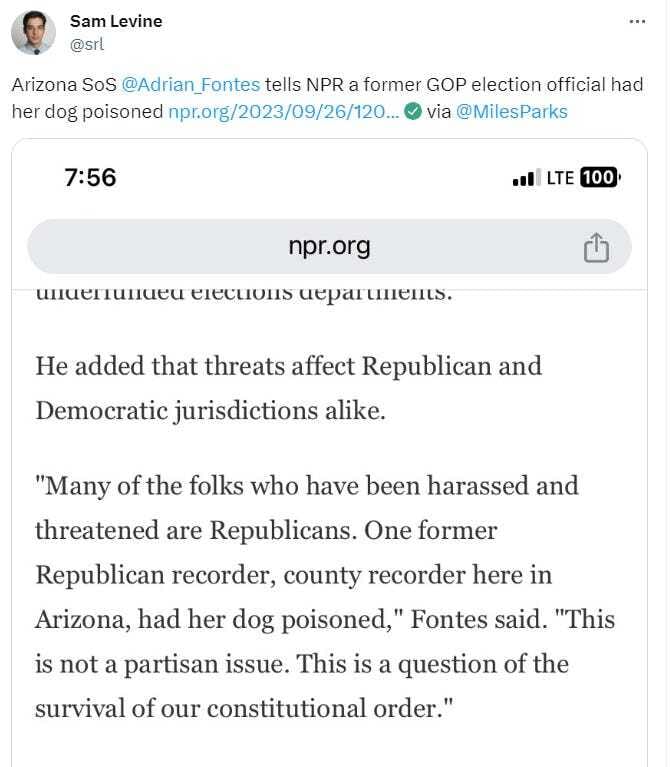First, the #electionfraud Twitterverse claimed that the state Senate had indicted Gov. Katie Hobbs on drug and human trafficking charges, among other crimes.1
Then, the same conspiracists shared breaking news that Hobbs had fled Arizona with her top two Democratic allies — Secretary of State Adrian Fontes and Attorney General Kris Mayes — perhaps because of the charges or perhaps so they could take bribes.
Also, it couldn’t be a coincidence that it happened just as President Joe Biden came to town.

Arizona got hit with a wave of disinformation this week, offering a preview of what the next year and a half has in store for us as residents of a swing state in reality-challenged times.
Disinformation is powerful and profitable. It can make stars out of mediocre politicians and turn Twitter accounts into seven-figure businesses.
But it has to be believable.
The first conspiracy was so absurd that even Republican Sen. Wendy Rogers chimed in, eventually, to declare it “FAKE NEWS.” But the second lie was based on a nugget of truth, which made it all the more believable and irresponsible.
You see, Hobbs, Fontes and Mayes were all in D.C. for separate, overlapping trips. Fox News declared the “mysterious disappearance” to the place where all politicians regularly go meant Hobbs had “stepped down” as governor. In reality, Arizona just has a really old constitutional provision stating that if a governor leaves the state, the next in line takes charge temporarily. If the second-in-line is also out of state, the acting governorship passes down the line. It doesn’t really make sense these days, but it’s the law.
Which brings us to Kimberly Yee, the fourth in line for the governorship, who kicked off this latest disinformation cycle with a single tweet.

That was Yee’s most popular tweet of all time. Usually, Yee’s tweets are lucky to reach a few hundred eyeballs. This one got more than a million impressions. Yee’s tweet wasn’t a lie, or even grossly misleading. But she’s smart enough to know exactly what she was tapping into — the chorus of America Firsters still screaming about the illegitimate governor.
For Yee, it’s all about attention. She’s hoping to use the Treasurer’s Office as a springboard to the governorship, à la Doug Ducey, and a few tweets that go viral in the MAGA Twitterverse can’t hurt.
For the internet conspiracists who latched onto, amplified and distorted Yee’s announcement, it’s also all about attention. These days, they’re earning money based on the number of eyeballs on their tweets — whether they’re fact or fiction.

Selling believable lies about Arizona politics is a good business. 2 The disinformation industrial complex has even spun off its own cottage “fact-gathering” industry providing nuggets of truth to bolster the lies, as Votebeat’s Jen Fifield found.
Fifield’s3 latest piece centers on Local Labs, a “journalistic” outfit that requests massive loads of public records from government agencies, often election offices. Normally, we’d cheer that kind of effort. But Local Labs isn’t what it seems.
Local Labs’ CEO Brian Timpone has quite a reputation in this business since his last endeavor, Journatic, which was essentially a wire service employing overseas labor using fake, American-sounding names to cover small towns. A bunch of papers paid for the service, then dropped it after a classic This American Life episode exposed the whole business model. Then came the plagiarism scandal.
Now Timpone is riding the election fraud wave, using Local Labs and its web of conservative-leaning news-ish sites to request data to “expose election fraud that he is sure exists,” Fifield writes. At the same time, Local Labs gets paid by election-denying organizations to request and gather that data to help bolster their own claims.
The websites often put out wrong or misleading reports that lead to real damage, like the time they erroneously claimed to have found an 8,000-vote discrepancy in Yavapai County proving there were “more votes than registered voters who voted” despite officials explaining they were looking at two different files.
It’s a huge time-suck for officials who have to fulfill the requests. And then they get harassed over the false claims Local Labs publishes.
“They just put the information out, and we are left defending ourselves,” Yavapai County Recorder Michelle Burchill told Fifield. “Then we are being harassed.”

That kind of targeted disinformation and ensuing personal harassment is a big part of why election officials are leaving the profession in droves, which ultimately makes our elections less secure because nobody running them has any expertise.
But to Timpone and his “pink slime” news network and the others like him who sell conspiracies online, it’s just business.

Books for votes: President Joe Biden came to Arizona to announce he’s building an $83 million John McCain Library at ASU with federal COVID-19 money. He mostly trash-talked his once and future presidential rival. U.S. Sen. Kyrsten Sinema also wants credit for the library.
It’s still unofficial: Kari Lake continued announcing that she’s going to announce a run for U.S. Senate, teasing out a “coming soon” video and doing a sympathetic interview with a cigarette-smoking Roseanne Barr about being canceled for tweeting that an Obama aide looked like “muslim brotherhood & planet of the apes had a baby.” It looks like Roger Stone is next. Lake told the Wall Street Journal that October 10 will be the big day. No word yet on whether 2022 Republican nominee Blake Masters is still planning to get into the race or if Pinal County Sheriff Mark Lamb will have the good sense to bow out of the primary.
Politicians choose their voters: The Phoenix City Council finally adopted its redistricting plan, which didn’t change the council boundaries much, despite some residents’ desire to change the non-contiguous District 6, which captures Arcadia and Ahwatukee Foothills, the Republic’s Taylor Seely reports.

Oops: Tempe cops are reviewing all major cases in the past three years after the new chief realized its forensic team didn’t have proper training and certification, putting prosecutions of serious crimes in jeopardy, the Republic’s Sam Kmack reports. The former Tempe Police Chief, Jeffrey Glover, left the job this summer to become Gov. Katie Hobbs’ Director of Public Safety. He’s one of the few director nominees that the state Senate has actually confirmed.
Finally some good news: Pinal County’s new elections building is coming in ahead of schedule and under budget, Pinal Central’s Mark Cowling reports. The old “cramped” building took some of the blame for the county’s string of recent election screw-ups.

We got a wholesome kick out of this story from the Eastern Arizona Courier’s Brooke Curley about one of the big controversies in Safford — a tattoo shop owners’ attempt to revive “cruising” Main Street, which would end before the 10 p.m. town curfew for minors.
But the local police chief smells trouble.
“Prior to my tenure here, there were problems with drinking and fighting on Main Street,” Chief Brian Avila told the paper.
The chief of police signs the permit in town, and if the kids want to cruise Main, they’ll have to go through him first.
“We’re not trying to be the party poopers here,” he said. “We’re just trying to keep everyone safe.”
